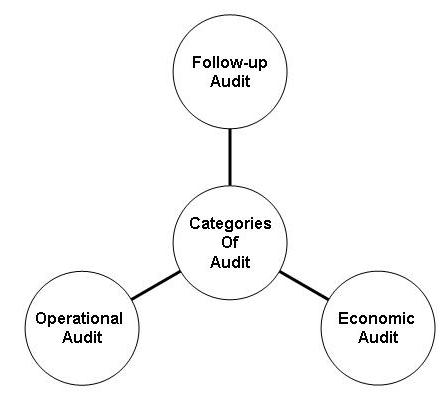There are different types of audits performed to check discrepancies in various departments some of the types of audits are described.
- Economic audits or reviews.
The figure explains the different categories of audits that play a very important role in the assessment of project quality.

Figure : Different types of audit
Economic audits or reviews: These audits are autonomous assessments which are performed to check if the organisational function of financial data is in all fair, correct and constant.
Operational audits: Operational audit facilitates continuous improvement since it aims to find facts of operational efficiency of processes. It is a future- oriented, methodical, and autonomous assessment of organisational actions. Fiscal data may be used, but the chief sources of proof are the operational policies and achievements related to organisational goals. Internal controls and efficiencies are examined during this review.
Follow-up audit: Follow-up Audit is an audit conducted around six months after an internal or external audit account has been issued. They are designed to examine corrective action that has been taken on the audit issues as mentioned in the original report. The findings of this report will be published to external auditors during the surveillance audit.
Audit criteria refer to the set of policies, procedures and requirements used as a reference. The audit criteria should establish the area of audit, specifically the procedures and any other industry specific regulations or any other contractual requirements. A check list is a valuable source which helps in explaining the audit criteria requirements. They need to be developed to provide assistance to the audit process. This will help the auditor to concentrate on the salient items of the audit and also not miss the content. The checklist enables the author to determine in advance the skill or expertise needed to audit to determine in advance the skill or expertise needed to audit and also that would be needed to evaluate the response by the concerned department and also place the right methods of evaluation.
Not all the testing methods are equally shaped on one hand for instance; there are informal assessment methods that serve as practice sessions in preparing for applying compliance certificates. Then, there are formal testing methods that must mandatory meet the exact requirements that are aimed by the industry standard testing maturity model integration (TMMi)
There arise few criteria specific questions in the assessment of project quality. They are:
- Scientific quality of the project quality of the literature analysis.
- Are the objectives of project quality clear, well argued.
- Is the quality methodology satisfactory?
- Is the project innovative?
- Is the project relevant? Is the project in the framework of the call for proposals?
- Is it well adapted to the professional?s expectations?
- Are the stakeholders active and diversified?
- Can the goals be reached within the duration of the project?
- Final assessment. Are the expected means realistic according to the goals and methods?
- Overall assessment. Strengths and weakness of the project.